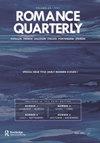现代性、对意义的探索和19世纪末20世纪初的西班牙街车体验马德里:克莱恩、加尔多和帕尔多·巴赞
IF 0.2
3区 文学
0 LITERATURE, ROMANCE
引用次数: 0
摘要
摘要本文使用三个以马德里为背景的西班牙短篇小说,贝尼托·佩雷斯·加尔多的《La novera en el tranvía》(1871年)、克莱恩的《Doña Berta》(1892年)和艾米莉亚·帕尔多·巴赞的《en tranvía》(1901年),讲述了这座城市日常生活中令人疏远的经历。人们关注马德里有轨电车的运动,以及这场运动如何反映现代性的一个决定性特征,即工业革命后对意义的探索。本文将城市地理学和文学分析相结合,使城市作为进步的总体理想的概念变得复杂,并强调了现代城市体验的混乱。本文章由计算机程序翻译,如有差异,请以英文原文为准。
Modernity, the Search for Meaning, and the Spanish Streetcar Experience in Late Nineteenth- and Early Twentieth-Century Madrid: Clarín, Galdós and Pardo Bazán
Abstract Using three Spanish short stories set in Madrid, Benito Pérez Galdós’s “La novela en el tranvía” (1871), Clarín’s “Doña Berta” (1892), and Emilia Pardo Bazán’s “En tranvía” (1901), this article speaks to the alienating experience of everyday life in the city. Attention is paid to the movement of streetcars in Madrid and how this movement reflects a defining characteristic of modernity, the search for meaning after the industrial revolution. Mixing urban geography and literary analysis, this article complicates the notion of the city as totalizing ideal of progress and instead stresses the messiness of modern urban experience.
求助全文
通过发布文献求助,成功后即可免费获取论文全文。
去求助
来源期刊

ROMANCE QUARTERLY
LITERATURE, ROMANCE-
CiteScore
0.30
自引率
50.00%
发文量
18
期刊介绍:
Lorca and Baudelaire, Chrétien de Troyes and Borges. The articles in Romance Quarterly provide insight into classic and contemporary works of literature originating in the Romance languages. The journal publishes historical and interpretative articles primarily on French and Spanish literature but also on Catalan, Italian, Portuguese, and Brazilian literature. RQ contains critical essays and book reviews, mostly in English but also in Romance languages, by scholars from universities all over the world. Romance Quarterly belongs in every department and library of Romance languages.
 求助内容:
求助内容: 应助结果提醒方式:
应助结果提醒方式:


